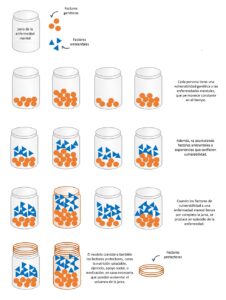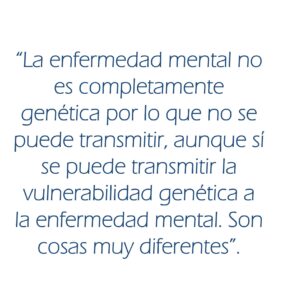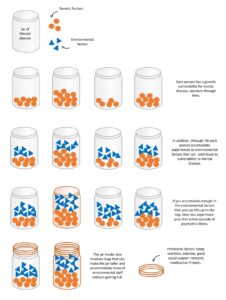Español – Como experta en asesoramiento genético en trastornos psiquiátricos, la Dra. Jehannine Austin ayuda a las personas con estos trastornos a entender las causas de su enfermedad y les muestra que no es culpa suya que hayan desarrollado un trastorno psiquiátrico.

Jehannine Austin es profesora de Psiquiatría y Genética Médica en la Universidad de British Columbia, Canadá, además de directora ejecutiva del Instituto de Investigación en Salud Mental y Consumo de Sustancias de la misma universidad y fundadora de la Clínica ADAPT, primera clínica del mundo que ofrece asesoramiento genético en psiquiatría a personas que han sido diagnosticadas o tienen un familiar con una enfermedad mental.
Apasionada de su trabajo en la clínica, la Dra. Austin nos cuenta cómo el asesoramiento genético puede ayudar a las personas que viven con una enfermedad mental y nos muestra una sencilla forma de explicar o entender que cada persona tiene una susceptibilidad genética a la enfermedad mental y las experiencias que vivimos a lo largo de la vida y factores ambientales pueden contribuir de forma protectora o negativa en el origen de la enfermedad.
Ha comentado alguna vez que el asesoramiento genético es una profesión basada en tomar lo que conocemos sobre genética y utilizarlo para ayudar a las personas. ¿Cómo es el asesoramiento genético en el contexto de los trastornos psiquiátricos?
Es igual que en el ámbito del cáncer o las enfermedades cardiovasculares. Se trata de tomar lo que sabemos a partir de la investigación y hacerlo útil para la gente que vive con trastornos psiquiátricos y sus familias.
Una de las cosas que confunde a la gente a veces es que, a menudo no hay pruebas genéticas en el contexto del asesoramiento genético en trastornos psiquiátricos. Algunas personas piensan que entonces no se puede hacer asesoramiento genético, y eso es incorrecto. No hace falta hacer pruebas genéticas para que el asesoramiento genético sea útil.
En el contexto de los trastornos psiquiátricos, el asesoramiento genético trata de ayudar a las personas con la carga emocional (culpabilidad, vergüenza, estigma…) que unen a su explicación sobre la causa de la enfermedad. Se trata de ayudar a las personas a entender que si tienen un trastorno psiquiátrico no es su culpa. Y al mismo tiempo trata de ayudarles a entender que, aunque no es su culpa, hay cosas que se pueden hacer para proteger la salud mental en el futuro.
Los trastornos genéticos surgen de una combinación de factores de vulnerabilidad genéticos y ambientales. ¿Cómo explican esta complejidad a los pacientes y familiares?
Utilizamos una analogía visual para ayudar a la gente a entender cómo los genes y las experiencias vitales trabajan juntos para causar enfermedad mental. Utilizando solo palabras es un poco abstracto por lo que usamos la analogía de una jarra de enfermedad mental. Explicamos que cada persona tiene una jarra de enfermedad mental y que para experimentar un episodio de enfermedad mental la jarra tiene que llenarse hasta arriba. Existen dos factores de vulnerabilidad que pueden llenar la jarra. Los factores genéticos, que representamos como bolas naranjas, muestran una cantidad constante en el tiempo que es diferente para cada persona. Lo que cambia en el tiempo es cuántos factores ambientales o experiencias, representados por triángulos azules, tenemos en nuestras jarras. Con el tiempo acumulamos más de estos triángulos y si se acumulan los suficientes entonces la jarra se llena y se experimenta el primer episodio de enfermedad mental. Así es como lo explicamos.
Para mí, la mejor parte del asesoramiento genético que hacemos es que podemos ayudar a la gente a entender cómo ponerse mejor. El modelo de la jarra de enfermedad mental también incluye anillas que hacen la jarra más alta y permiten que haya un mayor número de factores ambientales sin que se llene. Hay ejemplos de factores protectores basados en evidencias, como son dormir bien, la nutrición, hacer ejercicio, tener una buena red social de apoyo, encontrar formas más efectivas de manejar el estrés o la medicación, para aquellas personas que ya han llenado la jarra y han experimentado un episodio activo de enfermedad mental. A la gente le gusta esta analogía y parece que tiene sentido para ellos.

Una de las preocupaciones más comunes para los pacientes adultos es la transmisión de la enfermedad a su descendencia. ¿Cómo manejáis esta situación en las familias con trastornos psiquiátricos?
Una de las cosas que creo que la gente encuentra útil es entender que la enfermedad mental no se hereda. Solo se pueden transmitir enfermedades que son enteramente genéticas en origen. La enfermedad mental no es completamente genética por lo que no se puede transmitir, aunque sí se puede transmitir la vulnerabilidad genética a la enfermedad mental. Son cosas muy diferentes.
A partir de los estudios de asociación de genomas completos sabemos que cada persona tiene una vulnerabilidad genética a la enfermedad mental. No eres biológicamente diferente si tienes una enfermedad mental. Ocurre que has experimentado los factores ambientales que rellenaron la jarra de enfermedad mental hasta arriba. Podría ocurrir a cualquier persona.
Y mientras que tus hijos podrían tener un riesgo más elevado a desarrollar una enfermedad mental, tienes la ventaja de que, si tienes una de estas enfermedades, sabes cómo es, lo que significa que puedes detectarla y proporcionar al niño una ayuda adecuada de forma temprana. Tenemos muchos datos de investigación que muestran que si se consigue un buen apoyo de forma temprana se obtiene un mejor pronóstico a largo plazo. Es muy importante que la gente entienda que tener una enfermedad mental no significa que no se deba ser padre o madre.
¿Cómo puede ayudar el asesoramiento genético a los pacientes con trastornos psiquiátricos?
Estamos encontrando que el asesoramiento genético es muy importante porque puede responder algunas de las preguntas fundamentales que tiene la gente. Cuando alguien es diagnosticado con un trastorno psiquiátrico a menudo tiene preguntas como ¿por qué yo? ¿por qué está ocurriéndome esto a mí? ¿es mi culpa? ¿podría haber hecho algo para prevenir esto? El asesoramiento genético que proporcionamos ayuda a responder estas cuestiones.
En los estudios que hemos hecho vemos que la gente a la que proporcionamos asesoramiento genético muestra un aumento dramático en su grado de sentimiento de empoderamiento. Tenemos datos cualitativos que muestran que después del asesoramiento genético encuentran más fácil hacer cambios de comportamiento que los ayudan a proteger su salud. También tenemos nuevos datos prometedores relacionados con el número de hospitalizaciones tras la consulta de asesoramiento genético.
Con esos resultados es sorprendente que no haya más clínicas con asesoramiento genético para trastornos psiquiátricos…

Es algo muy complejo. Uno de los problemas es que no hay asesores genéticos en cada país. Otro problema es que, a menudo, los psiquiatras piensan que es su trabajo. Y estoy de acuerdo. Debería ser su trabajo tener estas conversaciones con los pacientes. Pero la realidad es que sabemos que no lo hacen. Y no es que no les preocupe. Están sobrecargados con muchos pacientes y todas las cosas que realizan, como intervenir en crisis, cambios de medicación, intervenciones en intentos de suicidio…
Realizar el asesoramiento genético del que hablo requiere de una hora. Hace falta sentarse con alguien y profundizar en su caso. Por supuesto, los psiquiatras ayudan a la gente con la culpa, el miedo, el estigma…Es lo que hacen cada día. Lo que es especial sobre lo que hacemos es que ayudamos con esas emociones concretas que los pacientes asocian a su explicación sobre la causa de la enfermedad.
Otro problema es que, a menudo, los psiquiatras no se sienten completamente cómodos y seguros al tener conversaciones sobre genética con los pacientes, porque no recibieron formación en este tema durante su preparación. Así, el asesoramiento genético debería ser parte del trabajo de los psiquiatras, pero no tienen el tiempo y muchos no se sienten seguros.
Es una de las fundadoras de la Clínica ADAPT, la primera clínica del mundo en proporcionar asesoramiento genético para pacientes con trastornos psiquiátricos o personas con una historia familiar. ¿Cómo surgió la idea?
Estaba haciendo un doctorado en genética neuropsiquiátrica, tratando de encontrar variaciones genéticas que hagan a las personas más vulnerables a desarrollar condiciones como la esquizofrenia o el trastorno bipolar. Yo misma tengo una historia familiar de enfermedad mental y mi familia empezó a hacer preguntas como: ¿es esto genético? ¿qué significa esto para ti? ¿y para tu hermano? Me di cuenta muy pronto de que no podía coger mi trabajo en el laboratorio y traducirlo en un lenguaje que resultar útil para mi familia. Ellos estaban muy comprometidos, pero yo no tenía las herramientas para explicarles cómo el trabajo que estaba haciendo en mi doctorado podía marcar una diferencia para ellos. Pensé que probablemente mi familia no era la única haciéndose este tipo de preguntas y que posiblemente había muchas familias con estas preguntas que nadie estaba respondiendo. Esto me llevo a prepárame para convertirme en asesora genética, para ser capaz de responder estas preguntas a familias como la mía. También vivo con ansiedad y depresión por lo que es muy personal para mí.
¿Qué aproximación utilizan con las personas que van a la clínica?
Cuando una persona es referida a nuestra clínica, normalmente organizamos una cita telefónica para elaborar la historia familiar antes de la cita de asesoramiento genético. Lo hacemos como algo separado porque hablar sobre la historia familiar en el contexto de los trastornos psiquiátricos puede ser muy difícil para las personas y si alguien experimenta un nivel de angustia muy elevado después de hablar de esto, no será capaz de atender a lo que tenemos que compartir con él o ella para ayudarle.
Después de la cita telefónica, que suele durar unos 30 a 45 minutos, hacemos la sesión de asesoramiento genético, que puede ser presencial, a través de Skype, Zoom…según el paciente. Esta sesión está dirigida siempre por las preguntas o necesidades del paciente que está frente a nosotros y suele durar alrededor de 90 minutos. Además, tratamos de hacer un seguimiento de las personas alrededor de un mes después, para ver como ha asentado las cosas de las que hablamos y si hay algo más de lo que quieran venir a hablar. Solo vemos a aproximadamente un 5% de las personas de nuevo, por lo que los resultados que mencioné antes, que vemos después del asesoramiento genético son el resultado de una única sesión.
Es impresionante…
Sí. No estamos acostumbrados a ver efectos de esta magnitud tras una intervención de una única sesión. En psicología, por ejemplo, solemos ver resultados después de alrededor de 12 sesiones de terapia cognitiva de comportamiento. La diferencia es que en asesoramiento genético no hablamos sobre sentimientos como miedo, culpa, estigma, a lo largo de la vida. Hablamos sobre aquellas cosas que se relacionan de forma específica con la explicación de cada persona sobre el origen de su enfermedad. Y esto puede tratarse de forma más discreta. Es importante, pero al mismo tiempo es algo muy limitado en términos de lo que tratamos.
¿Tiene el asesoramiento genético diferente impacto para los pacientes según el tipo de trastorno psiquiátrico con el que hayan sido diagnosticados?
No. Pensamos que podría tenerlo y lo estudiamos, y encontramos que no hay diferencias (significativas estadísticamente) en términos de resultados del asesoramiento entre gente con diferente diagnóstico. Parece beneficiar a las personas independientemente de que tengan esquizofrenia, trastorno bipolar, ansiedad, trastornos de alimentación, depresión…
Los beneficios del asesoramiento genético no dependen de la utilización de pruebas genéticas. Entonces, ¿cuándo se considera una prueba genética para un paciente con un trastorno psiquiátrico?
Hay algunos síndromes genéticos que sabemos que pueden hacer que una persona tenga un trastorno psiquiátrico. Por ejemplo, condiciones como el síndrome 22q están asociadas a diversos problemas físicos y médicos. Si vemos que viene un paciente con paladar hendido o tetralogía de fallot, esto llamaría nuestra atención a pensar en un posible caso de 22q. En situaciones donde encontramos gente con otros problemas médicos o un miembro de la familia que sabemos que tiene una deleción en 22q, entonces tiene sentido hacer pruebas genéticas. Fuera de estas situaciones no solemos solicitarlo ya que las posibilidades de encontrar algo son bajas.
Hasta ahora no existe una herramienta genética que pueda decir si una persona desarrollará un trastorno psiquiátrico. No obstante, el conocimiento está aumentando. Hablemos de los valores de riesgo poligénico en trastornos psiquiátricos, ¿cómo de bien capturan la contribución genética a estos trastornos?

Muy mal en realidad. Si tomamos la esquizofrenia, que es el trastorno psiquiátrico del que sabemos más, el mejor valor de riesgo poligénico que podemos construir explica menos del 15% de la contribución al desarrollo de la enfermedad. Una buena amiga y colega, Naomi Wray, experta mundial en genética psiquiátrica estadística, ha trabajado mucho con valores de riesgo poligénico y según ella, la mejor estimación es que, en el futuro, el mejor valor de riesgo poligénico que podremos construir para la esquizofrenia solo explicará un 25% de la contribución global a desarrollar esquizofrenia. Y esta es la condición psiquiátrica de la que sabemos más a nivel genético. Para la depresión, el mejor valor de riesgo poligénico que podemos construir explica tan solo un 3%.
Esto es muy interesante, porque probablemente hay muchas empresas esperando a ofrecer valores de riesgo poligénico para todos estos trastornos.
Ya lo hacen y las personas los utilizan porque están preocupadas. La gente está muy asustada de los trastornos psiquiátricos y cuando tienen una historia familiar de algo tienen ansiedad sobre ese tema. Así que están utilizando los servicios de estas empresas online que les proporcionan riesgos poligénicos.
Lasse Folkersen, que ha desarrollado una página web que calcula valores de riesgo poligénico y es de acceso abierto, reconoce que los valores de riesgo poligénico van a utilizarse nos guste o no, por lo que su posicionamiento es “ok, entonces voy a hacer que sea lo mejor que pueda y asegurarme de que la gente tiene acceso a buena información, con las menores barreras posibles”. Hemos trabajado en un par de proyectos de investigación y comparto sus motivaciones.
Es como cuando empezaron las primeras pruebas genéticas directas al consumidor.
Exactamente. Para mí es como si se repitiera la historia. Era asesora genética cuando empezó 23andMe. La reacción en contra de la empresa fue muy grande en aquel momento, pero, por supuesto que no iban a cerrar. Lo que ocurrió es que hicieron lo que querían hacer sin la participación de asesores genéticos u otros profesionales que podrían haber ayudado a hacerlo menos dañino. No quería repetir esa historia.
Nunca me he hecho un análisis genético. Sé de genética y no estoy interesada. Pero eso no quiere decir que no pueda ayudar a otra gente a tomar decisiones informadas sobre lo que es correcto para ellos basadas en sus valores genéticos. Y si las pruebas genéticas van a estar disponibles para la gente (que lo van a estar), quiero asegurarme de que tienen acceso a la información de mejor calidad, presentada de la forma más comprensiva en la que podamos, y de que tienen apoyo para hacer frente a los resultados.
¿Podrían los valores de riesgo poligénico ser útiles en la práctica clínica?
Creo que eventualmente serán utilizados en la clínica. Pero si considero que el mejor valor de riesgo poligénico que podemos conseguir para la esquizofrenia explicará alrededor del 25% de la contribución a desarrollar la enfermedad… ¿es eso útil?
La gente está tan asustada de los trastornos psiquiátricos que me preocupa no ver nunca a las personas que podrían beneficiarse más del asesoramiento genética porque tienen miedo a venir. Esperan que les vayamos a decir que están condenados, y eso no es lo que hacemos.
Para mí, si la gente está asustada y obtener un valor de riesgo poligénico es la única cosa que se atreven a hacer, entonces, quizás es una forma en la que puedo verlas. Quizás los valores de riesgo poligénico nos proporcionen algo de lenguaje con el que podamos hablar. Si me permiten contactar con más gente que necesite asesoramiento genético, entonces me vale. Cuando las personas quieren hacerse una prueba genética, lo que quieren es control. Están asustadas y buscan un sentimiento de control. Podemos proporcionárselo a través del asesoramiento genético, sin pruebas genéticas. Eso es lo que muestran nuestros datos.
English – As an expert in psychiatric genetic counseling Dr. Jehannine Austin helps people with psychiatric disorders to understand the causes of their illness and show them that it is not their fault they have a psychiatric disorder.

Dr. Jehannine Austin is a Professor in Psychiatry and Medical Genetics at the University of British Columbia, as well as Executive Director of the BC Mental Health and Substance Use Services Research Institute, and one of the founders of the ADAPT Clinic, first clinic in the world to provide psychiatric genetic counseling to people who have a diagnosis of mental illness or a family member with a mental illness.
A big passionate about their job at the clinic, Dr. Austin tells us how psychiatric genetic counseling can help people who live with a mental illness and shows us a simple way to explain or understand that everyone has a particular genetic susceptibility to mental disease and that the experiences we live through life and environmental factors can contribute in a negative or protective manner to the origin of the illness.
You have said before that genetic counseling is a profession about taking what we know from genetics and using that to help people. How is genetic counseling in the context of psychiatric disorders?
It is the same thing as it is in the context of cancer o cardiovascular diseases. It is about taking what we know from research and making it useful to people who live with psychiatric disorders and their families.
One of the things that confuses people sometimes is that in the context of psychiatric disorders there is often no genetic testing. Some people think that, then you cannot do genetic counseling and that is wrong. You do not need to have genetic testing for genetic counseling to be useful.
In the context of psychiatric disorders, genetic counseling is about helping people with the emotional staff (guilt, blame, shame, stigma…) that they attach to their explanation for the cause of illness. It is helping people to understand that if they have a psychiatric disorder, it is not their fault. And at the same time, it is about helping them to understand that while it is not their fault there may be things that we can do to be better protect the mental health in the future.
Psychiatric disorders arise as combination of genetic and environmental vulnerability factors. How do you explain this complexity to patients and relatives?
We use a visual analogy to help people to understand how genes and experiences work together to cause mental illness. Using only words is a bit abstract so we use the analogy of a jar of mental illness. We explain that everybody has a mental illness jar and that, in order to be actively experiencing an episode of mental illness, the jar has to be filled up to the top. We talk about how there are two different vulnerability factors that we can use to fill the jars. We represent genetic factors by orange balls, and we show how their amount is constant over time and everybody has a different number. What can change over time is how much of environmental factors or experiences (represented by blue pyramids) we have on our jars. Over time we may accumulate more of these pyramids and if you accumulate enough of them that your jar fills up to the top, then you experience your first active episode of psychiatric illness. That is how we explain how illness arises.
To me the best part of the genetic counseling that we do is to help people to understand how to get better. The jar model also involves rings that can make the jar taller and accommodate more of environmental staff without getting full. We use good based-evidence examples of protective factors like sleep, nutrition, exercise, good social support network, finding more effective ways of managing stress, and psychotropic medication, for people who have already experienced a full jar, an active episode of mental illness. People love this analogy, and it seems to make sense for them.

One of the most common worries or fears for adult patients is the transmission of the disease to their children. How do you deal with these in families with psychiatric disorders?
One of the things that I think people find useful is understanding that you do not inherit mental illness. You can only pass on illnesses that are entirely genetic in origin. Mental illness is not entirely genetic. So, you cannot pass on mental illness, but you can pass on a vulnerability to mental illness. These are very different things.
We know from Genome Wide Association Studies that everyone has a vulnerability to mental illnesses. You are not biologically different if you get a mental illness. It is that you experimented the environmental factors that filled the mental illness jar to the top. It could happen to anybody.
While your children may have a higher risk of developing mental illness, you have the advantage that if you have mental illness, you know how it looks like. That means you are really well placed to get the child appropriate help early on. We have lots of research data showing that if you get support early on there is a better long-term prognosis. It is really important that people understand that having a mental illness doesn’t mean that you shouldn’t be a parent.
How can genetic counseling help patients with psychiatric disorders?
We are finding that genetic counseling in psychiatric disorders is very important because it can answer some of the most fundamental questions that people have. When people get diagnosed with a psychiatric disorder, they often have questions like, why me? Why is this happening to me? It is my fault? Is there something I could have done that could have prevented this? The genetic counseling that we are doing is helping at the level of answering these questions.
In the studies we have done we see that people we have provided genetic counseling to have quite dramatic increases in the degree they feel empowered. We have some qualitative date showing that after genetic counseling people find it easier to engage in some of the behavior changes that help protecting their mental health. We also have new promising data related to the number in hospitalizations after genetic counseling.
With those results it is surprising then that there are not more clinics with psychiatric genetic counseling…
It is a very complex thing. One of the problems is that there are not genetic counselors in every country. Another problem is that psychiatrists often feel that it is their job to do this. And I would agree. It should be their job to have these conversations with the patients. But the reality is that we know they don’t do it. And it is not that they don’t care. They are overwhelmed with so many patients and all the things they do as crisis intervention, medication changes, suicide interventions…
To do the kind of genetic counseling that I am talking about needs a good hour. You need to be able to sit down with somebody and dig into their case. Of course, psychiatrists can help people with guilt, blame, stigma…That’s what they do every day. But what is special about what we are doing is that we are helping with those emotions that patients specifically relate to the explanations of the cause of illness.
Another problem is that psychiatrists often don’t feel completely confident in having conversations with people about the role genetics because they did not get much education of this subject during their training. So, they feel genetic counseling in psychiatric disorders should be they job but they do not have the time, and many do not feel confident.
You are one of the founders of ADAPT Clinic, first clinic in the world to provide psychiatric genetic counseling for patients with psychiatric disorders or people with family history. Where did the inspiration for the clinic came from?
I was doing a PhD in neuropsychiatric genetics, so I was trying to find the genetic variations that make people more vulnerable to developing conditions like schizophrenia or bipolar disorder. I have a family history of mental illness and my family started asking me questions. Is this illness genetics? What does this mean to you? Or your brother? I realized very quickly that I could not take the molecular lab work that I was doing and translate that into language that my family would find useful. They were really engaged but I did not have the skills to explain how the work I was doing in my PhD made any difference for them.
I realized that probably my family was not the only one asking this kind of questions and there were probably lots of families with these questions that nobody was answering. This drove me to my training to become a genetic counselor, wanting to be able to answer these questions for families like mine. I live with anxiety and depression too, so it is very personal to me.
What approach do you use with the people who go to the clinic?
When people are referred to our clinic, we usually set up an appointment to do family history over the phone before the person has the actual appointment. We do that as a separate thing because talking about family history in the context of psychiatric disorders can be very difficult for people and, if somebody is in a great deal of distress after talking about this, they won´t be able to attend to what we have to share with them to help.
After this telephone appointment, which usually takes around 30-45 minutes, people will have the actual genetic counseling session by telephone, zoom, on-site…This one is always driven by the questions or the needs of the patients in front of us and usually lasts around 90 minutes. We also try to follow up with people about a month later just to see how the things we talk about have settled with them and if there is something else they want to come back and to talk about. We only see around 5% people again, so all the outcomes that I said before, the ones we see after the genetic counseling, are the result of a single session.
That is impressive.
Yes. We are not used to see effects of that magnitude from single session interventions. In psychology, for example, we are used to see effects after around 12 sessions of cognitive behavioral therapy. The difference is that in genetic counseling we are not talking about guilt, blame, stigma, fear…in life, we are talking about those things as specifically related to people´s explanations of the cause of illness. And that can be caught often in a discrete way. It is important but also very limited in terms of what we talk about.
How many patients do your team see in one week?
One of the good things of starting a new service that nobody has offered is that you are not constrained to the models that already exist. We did not want people going in and people going out. We wanted to make sure that we were making a difference for the people we were seeing and asked to ourselves how many patients we could see in a week. We started with 4 and that was fine. Then 5, also fine. But from 6 it started to get difficult. We even have done 8 but that was too much overwhelming for the counselor. So now we take 5-6 new patients a week.
Does genetic counseling have different impact for the patients depending on the kind of psychiatric disorder?
No. We thought it would and we studied it and found that there are not statistically significant differences in terms of outcomes between people with different diagnosis. Seems to benefit people no matter whether they have schizophrenia, bipolar disorder, anxiety, eating disorders, depression…
Benefits of genetic counseling do not depend on the use of genetic testing. Then, when is genetic testing considered for a patient with a psychiatric disorder?
There are some genetic syndromes that we know can make people to have a psychiatric disorder. Conditions like 22q syndrome are associated with a lot of physical and medical problems. If we have a patient coming for psychiatric genetic counseling and we see that the patient has a with cleft palate o history of tetralogy of fallot, that would call our attention and we would think about the possibility of a case of 22q. In situations in which we find people with other medical problems or a family member who is known to have a deletion in 22q, then testing makes sense. Outside of these situations we don’t usually get into it because the chances of finding something are lower.
So far there is no genetic tool that can tell if a person will develop a psychiatric disorder. But knowledge is improving. Let’s talk about polygenic risks scores in psychiatric disorders. How well do they capture the genetic contribution in these disorders?
Very badly actually. If we take schizophrenia, the psychiatric disorder that we know about the most, the very best polygenic risk score that we can construct explains less than 15% of the overall liability of developing the illness. I have a good friend and colleague, Naomi Wray, leading psychiatric statistical geneticist in the world, who has done a lot of work in polygenic risk scores. According to her, the best estimate is that in the future the very best polygenic risk score that we will ever be able to construct for schizophrenia will only explain 25% of the overall liability of developing schizophrenia. And that is the psychiatric condition about which we know the most of genetically. For depression the very best polygenic risk score we can construct explains around 3%.
This is especially interesting because probably there are many companies waiting to offer polygenic risk scores for all these disorders.
They already are and people are using them because people are concerned. People are very afraid of psychiatric disorders and when they have a family history of something they get anxious at that. So, they are already using these online companies that will provide polygenic risk scores for them.
Lasse Folkersen who runs a polygenic risk score web that is opensource recognizes that this is going to happen whether we like it or not so his take is “ok, then I am going to make it as good as I can, and make sure people have access to good information in a low barrer manner”. We have been working in a couple of research projects and I share his motivations.
It is like when first direct to consumer genetic tests appeared.
Exactly. It feels like history repeating to me. I was a genetic counselor already when 23andme started. The reaction against 23andme at that time was very big but, of course they were not going to shut down. What happened then is that they did what they wanted to do without the involvement of genetic counselors or other people that could have helped to make it less damaging for people. I did not want to repeat that history.
I have never had any genetic testing myself. I know about genetics, and I am not interested. But that doesn’t mean I can’t help other people to make informed decisions that are based on their values about what is right for them. And if genetic testing is going to be available for people (which it is) I want to make sure that they have access to the best quality information that is presented in the most understandable way that we can, and they have support for dealing with the results.
Could polygenic risk scores be useful at the clinical practice?
I think they will eventually be used in the clinic. But if I consider that the best polygenic risk scores that we will get for schizophrenia will explain about 25% of the liability of developing the disease, is that useful?
People are so afraid about psychiatric disorders that I worry that the people that could benefit the most of psychiatric genetic counseling will never be seen in our clinic because they are too afraid to come. They expect that they will be told they are doom, and that is not what we do.
To me if people are afraid and polygenic risk scores are the only thing that they can bring themselves to do, then, maybe, that is a way I can get some of them. Maybe the polygenic risk score gives them some language we can talk about. If that allows me to get in touch with more people who need genetic counseling, then I will take it. When people want to get genetic testing, they want control. They are afraid and they want a sense of control. We can give that through genetic counseling without genetic testing. That is what our data shows.
Si te ha gustado esta noticia y quieres aprender más sobre Genética en Medicina, te interesan nuestros cursos y formación universitaria.



